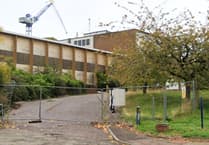UNION bosses have blamed Government under-funding and increasing demands on overstretched staff for the fact that inspectors have found that South Western Ambulance Service requires improvement.
Inspectors from the Care Quality Commission have given the ambulance trust an overall rating of ‘requiring improvement’ following an inspection carried out in June.
However, the overall rating came despite some aspects of the service being rated good outstanding, including the way staff acted with professionalism under pressure.
The team of inspectors from the CQC, the independent regulator of health and social care, looked at six areas of core services.
Chief inspector of hospitals Professor Sir Mike Richards said: ‘As demand for emergency care grows year by year, our ambulance services have never been busier.
‘I know that South Western Ambulance Service is at the forefront of national improvements in the ambulance service, exploring better ways to deal with emergency calls so that people get the attention they need, in the right place and at the right time.
‘The trust has a strong and stable leadership team which has put quality and safety as key priorities and organised the staff and resources well, responding well, on the most part, to the most urgent calls and working closely with other NHS providers to maximise the effectiveness of the service.
‘We found staff in the emergency operations centre and emergency and urgent services to be outstanding in the way they supported people who were distressed or overwhelmed in often highly stressful situations.
‘However, we found some variation in quality across the services we inspected.
‘There were significant gaps in mandatory training and we found levels of staffing were not always sufficient to provide relief when staff were training or on leave.
‘I am concerned not all staff were reporting incidents particularly when they were verbally abused by callers. Some felt they did not have time to report incidents so losing the chance to learn from them and take appropriate action in future.’
A number of areas were highlighted as requiring improvement and inspectors will return at a later date to check on progress.
Since the report was published, UNISON, the union which represents ambulance staff, blamed the Government for failing to allocate more funding.
Chris Nelson, co-secretary for UNISON south west ambulance service branch, said: ‘All our staff in the ambulance service are working flat-out to maintain standards across the board.
‘Their caring and dedicated work in an incredibly challenging environment was rightly praised by the CQC. While services can and should improve, funding is simply inadequate to reach the standards we all want.
‘Staff will continue to make the best of what they’ve got, but without additional resources into ambulance services, demand on our members is just too high. Unless the Government allocates more funding and staffing, there’s a risk that quality will take another hit.
‘World-class public services need real investment in the people who carry them out, not ever-increasing demands on overstretched staff.
‘We have already started planning in partnership with management and the CQC to deal with issues in the report, despite the Government’s refusal to provide enough funding.’
In the 19 months to January this year, the trust was better than the national average for responding within eight minutes to the most urgent Red 1 calls which are classed as immediately life threatening.
Areas requiring improvement highlighted in the report are:
l Ensure work intensity and fatigue is monitored and action in place to mitigate risks to staff;
l Ensure a system in place informing patient transport service crews of important clinical information relating to the patients they convey;
l Healthcare assistants who undertake initial clinical assessments of patients must be assessed as competent before working independently;
l Ensure partly administered controlled medicines which are no longer required are disposed of in accordance with service standard operating procedures and that medicines are stored securely in the back of ambulances and cars when the crew is not present.
Some areas were rated as outstanding including ‘outstanding professionalism’ under pressure; staff in emergency operations centres show outstanding compassion and understanding; outstanding and commended programme to manage frequent callers.




Comments
This article has no comments yet. Be the first to leave a comment.